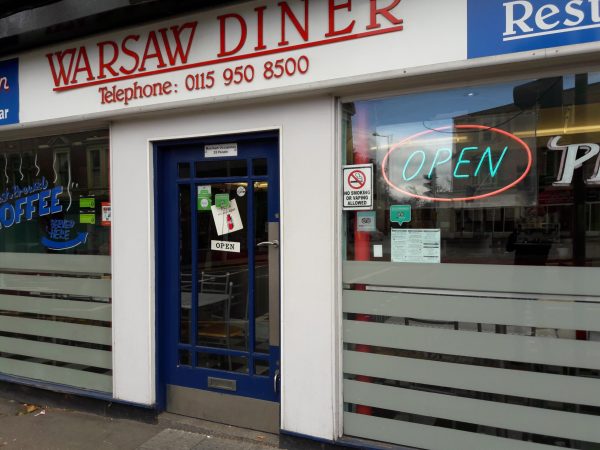12.03.18

Whether you are a student at Nottingham Trent University or a student at The University of Nottingham your rights are all the same. Moving to a new home is always exciting, if not somewhat stressful. Organising things like utilities can be confusing and at times consuming and then you need to be aware of what rights you have as a tenant. The following is the How To Rent Guide (updated Jan 2018) created by the Ministry of Housing to help you understand your rights.
Almost all student tenancy agreements are Assured Shorthold Tenancy agreements if you are living with more than one person. When you enter an assured shorthold tenancy –the most common type – you are entering into a contractual arrangement. This gives you some important rights but also some responsibilities. This guide will help you to understand what questions to ask, what your rights are, and what responsibilities you have. This will help you create a positive relationship with your landlord, but we also tell you how to get help if things go wrong.
Your landlord must provide you with a copy of this booklet, so bookmark this blog for the following checklist and keep it safe to protect yourself from potential problems at every stage.
- How long do you want the tenancy for? You can ask for a tenancy to be anytime between six months and seven years long. However a student lettings agency in Nottingham will usually state the length of the agreement i.e. 48 weeks up to 52 weeks.
- Decide which student area you would like to live in in Nottingham and how you are going to look for a student house. The larger the area where you are prepared to look, the better the chance of finding the right home for you. We cover student accommodation in Nottingham and areas such as; The Arboretum, The Park, City Centre, Lenton, Dunkirk, Beeston and many more.
- Have your documents ready. Student Landlords and Nottingham student lettings agents will want to confirm your identity and immigration status.
- Do you have the right to rent a student house in the UK? Landlords must check that all people aged over 18 living in their property as their only or main home have the right to rent. They will need to make copies of your documents and return your original documents to you.
- Will you need a rent guarantee? Some landlords might ask someone to guarantee your rent. If you don’t have a guarantor, ask Shelter for help. We ask for a guarantor for all our student accommodation Nottingham.
If you’ve signed for your Student Accommodation Nottingham through a lettings agent then please check the following:
Find out what fees (and costs) you will be charged and when you need to pay them. By law, a breakdown of all fees should be clearly visible to you in the agent’s
office and on their website. What independent complaints scheme is the agent a member of? Do they offer client money protection? By law, this information should also be clearly visible to you. Are they accredited through a professional body like ARLA, NALS, RICS or UKALA? This means they have the right protection for their clients’ money, and safeguards you if they go bust or misuse your funds (such as rent payments and your deposit). Look for the SAFEagent Nottingham sign too.
Deposit protection. If the landlord asks for a deposit, check that it will be protected in a government approved scheme. Some schemes hold the money, and
some insure it. You may be able to access a bond or guarantee scheme that will help you put the deposit together. For our student accommodation Nottingham we use MyDeposits, all details of which are found in the tenancy agreement as well as the prescribed information you receive once protected.
Smoking and pets. Check if there any rules about them for your student property Nottingham, as well as for other things such as keeping a bike, dealing with refuse and recycling.
Check who is responsible for bills such as electricity, gas, water and council tax. You or the landlord? Usually the tenant pays for these. Uni2 Rent offer bills inclusive packages for all our properties and so please ask a member of staff if you haven’t signed up for these to be included.
Fixtures and fittings. Check you are happy with them, as it is unlikely that you will be able to get them changed once you have moved in.
Smoke alarms – and carbon monoxide detectors if you have solid fuel appliances. Check these are provided. If not, your landlord must install them. They could save your life.
If the building becomes unfit to live in. Check that the tenancy agreement excuses you from paying rent should the building become unfit to live in because of a fire or flood.
Houses in Multiple Occupation Nottingham (HMO Nottingham). HMOs are usually properties in which unrelated people share facilities such as the kitchen or bathroom. Large HMOs (more than 2 floors, and more than 4 people) need to be licensed. Check your landlord has done that. In large HMOs in Nottingham, student landlords must by law give tenants a statement of the terms on which they live in the property.
- Make sure you have a written tenancy agreement and read it carefully to understand your rights and responsibilities. The landlord or agent usually provides
one but you can request to use a different version. The government has published a model tenancy agreement that can be used. If you have any concerns about the agreement, seek advice before you sign. - Agree an inventory (or check-in report) with your landlord and, as an extra safeguard, make sure that you take photos. This will make things easier if there is a dispute about the deposit at the end of the tenancy. If you are happy with the inventory, sign it and keep a copy.
- Remember to take meter readings when you move in. This will help make sure you don’t pay for the previous tenant’s bills.
- Contact details. Make sure that you have the correct contact details for the landlord or agent, including a telephone number you can use in case of an emergency.
If your landlord doesn’t provide these, they can’t evict you until they do:
- A gas safety certificate. The landlord must provide one each year, if there is a gas installation.
- Deposit paperwork. If you have provided a deposit, the landlord must protect it in a government approved scheme. Make sure you get the official information from the scheme, and that you understand how to get your money back at the end of the tenancy. Keep this information safe as you will need it later.
- The Energy Performance Certificate. This will affect your energy bills and the landlord must provide one (except for Houses in Multiple Occupation)
- A record of any electrical inspections. All appliances must be safe and checks every 5 years are recommended.
- Pay the rent on time. If you don’t, you could lose your home because you have broken your tenancy agreement. If you have problems, GOV.UK has links to further advice.
- Look after the property. But get your landlord’s permission before attempting repairs or decorating. It’s worth getting contents insurance to cover your possessions too, because the landlord’s insurance won’t cover your things.
- Be considerate to the neighbours. You could be evicted for anti-social behaviour if you aren’t.
- Not take in a lodger or sub-let without checking whether you need permission from your landlord.
- Make sure you know how to operate the boiler and other appliances and know where the stop cock, fuse box and any meters are located.
- Regularly test your smoke alarms and carbon monoxide detector – at least once a month.
- Report any need for repairs to your landlord. There will be a risk to your deposit if a minor repair turns into a major problem because you did not report it. Why try and make the time in your house share Nottingham as stress free as possible so please submit maintenance as per your welcome pack.
- Maintain the structure and exterior of the property.
- Fit smoke alarms on every floor and carbon monoxide alarms in rooms using solid fuels – such as coal and wood – and make sure they are working at the start of your tenancy. If they are not there, ask your landlord to install them.
- Deal with any problems with the water, electricity and gas supply.
- Maintain any appliances and furniture they have supplied.
- Carry out most repairs. If something is not working, report it to the landlord (or their agent) as soon as you can.
- Arrange an annual gas safety check by a Gas Safe engineer (where there are any gas appliances).
- Give at least 24 hours notice of visits for things like repairs – the landlord cannot walk in whenever they like.
- Get a licence for the property, if it is a licensable property.
- Insure the building to cover the costs of any damage from flood or fire.
- There may be costs for this, particularly if you rent through an agent. If not, you will be on a ‘rolling periodic tenancy’. This means you carry on as before but with no fixed term – you can leave at any time by giving one month’s notice. Or your landlord can end the contract at two months’ notice.
- Your landlord might want to increase your rent. Your landlord can increase your rent by agreement, or as set out in your tenancy agreement, or by following a
procedure set out in law.
- Giving notice. It is a legal requirement for landlords to give you proper notice if they want you to leave. Normally, the landlord must allow any fixed period of the tenancy to have expired, and they must have given at least two months’ notice. Your tenancy agreement should say how much notice you must give the landlord if you want to leave the property – one month’s notice is typical.
- Return of deposit. Try to be present when the property is inspected to check whether any of the tenancy deposit should be deducted to cover damage or cleaning costs (a ‘check-out inventory’). If you do not agree with proposed deductions contact the relevant deposit protection scheme.
- Rent. Make sure that your rent payments are up to date. Do not keep back rent because you think that it will be taken out of the deposit.
- Bills. Do not leave bills unpaid. This might have an impact on your references and credit rating.
- Clear up. Remove all your possessions, clean the house, take meter readings, return all the keys and give a forwarding address. The landlord is entitled to
dispose of possessions left in the property after, typically, 14 days.
- If you are having financial problems, or are falling into rent arrears, speak to your landlord as they may be helpful, and are likely to be more sympathetic if you talk to them about any difficulties early on. Should you need further help contact Citizens Advice or Shelter as soon as possible.
- If the property is in an unsafe condition and your landlord won’t repair it – contact your local authority. They have powers to make landlords deal with serious
health and safety hazards. - If you have a serious complaint that has been checked by your local authority, your landlord cannot evict you for six months, and must repair the fault.
- Unannounced visits and harassment from your landlord – contact your local authority, or if more urgent dial 999.
- If you are being forced out illegally, contact the police. If your landlord wants you to leave the property, they must notify you in writing, with the right amount of notice – you can only be legally removed from the property with a court order.
If you are concerned about finding another place to live, then contact the Housing Department of your local authority. Depending on your circumstances, they may have a legal duty to help you find accommodation and, even if not, they can provide advice. The local authority should not wait until you are evicted before taking action to help you. If you are reading a print version of this guide and need more information on the links, email PRSReview@communities.gsi.gov.uk. Download the How to Rent Guide.
If you are a Nottingham Trent University student looking for accommodation Nottingham or a University of Nottingham Student looking for student houses Nottingham we have you covered.
News & Blog
Keep up to date with the latest news from UNI2 Rent.







